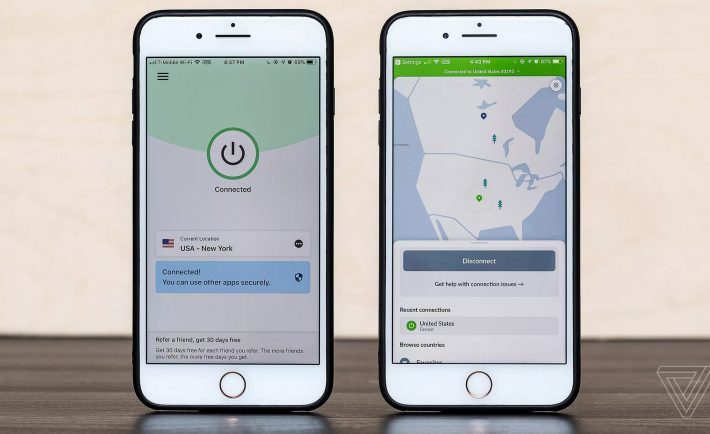VPNs can improve what you can do, see and watch on the internet. Whether you’re trying to get around state censorship, or you just want a few more titles in your Netflix catalog, they are a one-click solution. There are also significant privacy and security benefits to using a VPN. Let’s dig a little deeper and go over 5 ways a VPN supercharges your internet connection.
How A VPN Works

A VPN, or a virtual private network, has two main components. There’s the VPN client which is software on your computer and there’s the VPN server, which is a server configured to receive traffic from the client. The client routes all your traffic to the server through an encrypted tunnel over the public internet.
How A VPN Makes you Anonymous Online
You can think of a VPN like a mail forwarder. The client collects all your outgoing mail and wraps it in an encrypted envelope addressed to the server. Your ISP can see that you’re sending letters to a remote server, and it likely knows that this is a VPN server, but it’s unable to open the envelope and see the real intended address. Once the envelope arrives at the server, it’s opened and then sent over the VPNs IP address to the final destination. The site you are visiting can only see that the traffic originated from the VPN server. So they don’t know your real public IP address.
1. Unblock Thousands of Movies, Sports, and Services
Content on the internet is restricted to specific locations by archaic laws left over from the era of the living room television. Netflix in the US has hundreds of titles that you can’t get in Canada, the UK, or Australia. This makes little to no sense when we have fiber optic cable under the ocean and can stream content in real-time between continents. A VPN can get around these restrictions. As we previously mentioned, when connected to a VPN, all the sites you are visiting can see the IP address of the VPN server. By connecting to a VPN server in the US, Netflix thinks that you are in the US. Hulu, Netflix, SkySports, Amazon Prime, and Disney plus are all geoblocked in most countries. With a VPN you can access all of them.
2. Stops Your ISP Seeing What You Do Online
We all look at some sketchy stuff online. What we don’t need is for our internet service provider to keep a record of our browsing history. Not because it’s illegal or anything, but because if there’s a record of what we are doing online then we are trusting our ISP to keep that record safe. Hackers target ISPs because they collect data and data is valuable, and if your browsing history falls into the wrong hands then it can be used against you. Exposing you to identity theft, blackmail, hacks, and cease and desist notices if you torrent the occasional movie.
3. Protect Your Data On Public WiFi And Other Shared Networks
Let’s prefix this section by saying that the majority of the internet is encrypted with the HTTPS protocol. The S stands for secure, and with HTTPS your traffic is encrypted before it leaves your computer and no one can read it without launching a complicated man-in-the-middle attack.
The problem is that while 80% of the internet uses HTTPS, 20% of the internet doesn’t. When you are accessing a site with the older HTTP protocol, you’re sending all your information as clear text. Anyone can download free, open-source software to intercept all the traffic on the network. If you are logging in to an account, then they can see your password. If you are sending a copy of your passport they can grab that too. It’s not often that you find a site without HTTPS but it does happen. Just the other day, I was applying for a Turkish tourist visa, and that site asked for more than enough information to steal my identity, and it didn’t use HTTPS.
4. Avoid Cease And Desist Notices
When torrenting, your public IP address is extra public. It needs to be for the tracker to find peers. Problem is that rights holders don’t like people torrenting their content, so they’ve created software that records all the IP addresses torrenting a file and bulk sends ISPs cease and desist notices. If you are using a VPN, it’s not an issue. Any good VPN provider will throw that cease and desist notice in the trash where it belongs, but if you don’t have a VPN you’re exposing yourself to the risk of lawsuits, and annoying emails.
5. Prevent Data Throttling
Some ISPs, typically cheap ones in the developing world, throttle torrent and streaming traffic because it congests their network. We don’t think this is right! Paying customers should get the speeds they paid for irrespective of what they use their connection for. ISPs are businesses. Their profit is income – expenses and the main expenses they have are building and maintaining their network. If they can restrict heavy users then they can make more money, when what they should be doing is improving their network. With a VPN, it’s harder for an ISP to tell if you are sending torrent or streaming traffic, so they will struggle to restrict these traffic types.
In Summary
VPNs are a one-click solution to overcome geoblocking, protect data on public Wifi, prevent data throttling and torrent in peace. If you’re interested in trying one, we’d recommend the VPNs we have covered so far. That provider hasn’t ever been hacked, keeps no logs, and it’s big enough you can trust them, but not so big that all their IP addresses are known and flagged by sites.